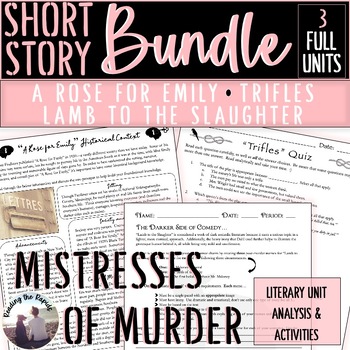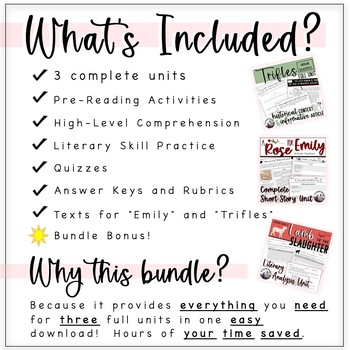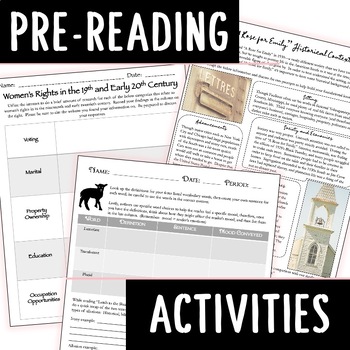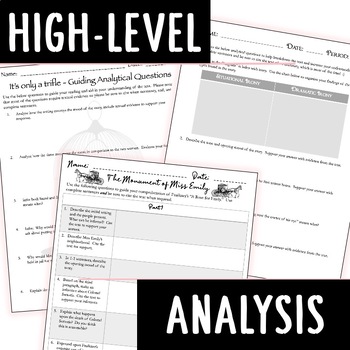Short Story Analysis Unit Bundle Trifles A Rose for Emily Lamb to the Slaughter
- Zip
Products in this Bundle (3)
Bonus
Description
This short story bundle contains three full units, each with a protagonist in desperate need of analysis, diagnosis and intervention! In this bundle for A Rose for Emily, Trifles and Lamb to the Slaughter, students will have the opportunity to analyze and interact with three murderous protagonists. Each story contains: pre-reading vocabulary, a pre-read activating prompt, during reading analysis questions, a quiz, and a post-reading activity. Answer keys and rubrics are included for everything!
The bonus file allows students to take on the role of a Forensic Psychologist and diagnosis the women, and, create a treatment plan, all while thinking critically and using textual evidence with their responses!
**This bundle contains ZIP file with PDFs; they are not editable. This is to help protect my work. If you are looking for something editable, this product does not give that capability. However, all PDFs can be used with distance learning, by using the mark up tools within the PDF.**
The bonus file cover the following CCSS:
Texts Types and Purposes:
CCSS.ELA-LITERACY.W.11-12.2
Write informative/explanatory texts to examine and convey complex ideas, concepts, and information clearly and accurately through the effective selection, organization, and analysis of content.
CCSS.ELA-LITERACY.W.11-12.2.B
Develop the topic thoroughly by selecting the most significant and relevant facts, extended definitions, concrete details, quotations, or other information and examples appropriate to the audience's knowledge of the topic.
CCSS.ELA-LITERACY.W.11-12.2.F
Provide a concluding statement or section that follows from and supports the information or explanation presented (e.g., articulating implications or the significance of the topic).
Research to Build and Present Knowledge:
CCSS.ELA-LITERACY.W.11-12.7
Conduct short as well as more sustained research projects to answer a question (including a self-generated question) or solve a problem; narrow or broaden the inquiry when appropriate; synthesize multiple sources on the subject, demonstrating understanding of the subject under investigation.
CCSS.ELA-LITERACY.W.11-12.9
Draw evidence from literary or informational texts to support analysis, reflection, and research.
CCSS.ELA-LITERACY.W.11-12.9.A
Apply grades 11-12 Reading standards to literature (e.g., "Demonstrate knowledge of eighteenth-, nineteenth- and early-twentieth-century foundational works of American literature, including how two or more texts from the same period treat similar themes or topics").
Keywords: A Rose for Emily, William Faulkner, Trifles, Susan Glaspell, Lamb to the Slaughter, Roald Dahl, unit, bundle





